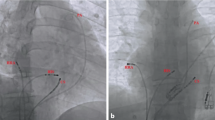Abstract
Elevated pulmonary vascular resistances occur to a variable degree in patients with chronic congestive heart failure (CHF). These might be caused by increased levels of endogenous vasoconstrictors, defective endothelial vasodilatory mechanisms or structural vascular abnormalities. To determine the contribution of defective endothelial mediated vasodilation, we tested 10 patients with CHF due to coronary artery disease (n=4) or dilated cardiomyopathy (n=5), and congenital corrected transposition of the great arteries (n=1) (median pulmonary artery pressure 36 mmHg, range of pulmonary vascular resistance 0.94–10.7 WE). Patients were in median functional class NYHA III, median left ventricular ejection fraction was 21%, median oxygen uptake at the anaerobic threshhold was 8.25 ml/kg/min.
Flow was measured by a flow wire (0.018 inch) positioned in a pulmonary artery branch with a diameter of 3–8 mm determined by intravascular ultrasound before. Acetylcholine infusion was adjusted to 10−6, 10−5 and 10−4 molar concentrations in the pulmonary artery branch. A dose dependent increase in flow between 64 to 140% was seen in 8 out of 10 patients. We conclude: Acetylcholine mediated vasodilation is found in patients with CHF and elevated pulmonary vascular resistances.
Similar content being viewed by others
References
Bocchi EA, Bacal F, Costa Auler JO, de Carvalho Carmone MJ, Belloti G, Pileggi F (1994) Inhaled nitric oxide leading to pulmonary edema in stable severe heart failure. Am J Cardiol 74: 70–72
Cody RJ, Haas GJ, Binkley PhF, Capers Qu, Kelley R (1992) Plasma endothelin correlates with the extent of pulmonary hypertension in patients with chronic congestive heart failure. Circulation 85: 504–509
Cremona G, Dinh Xuan AT, Higenbottam TW (1991) Endothelium-Derived Relaxing Factor and the Pulmonary Circulation. Lung 169: 185–202
Dalen JE, Matloff JM, Evans GL, Hoppin FG, Bhardwaj P, Harken DE, Dexter L (1967) Early reduction of pulmonary resistance after mitral valve replacement. New Engl J Med 277 (8): 387–394
Drexler H, Hayoz D, Münzel T, Hornig B, Just H, Brunner HR, Zelis R (1992) Endothelial function in chronic congestive heart failure. Am J Cardiol 69: 1596–1601
Furchgott RF, Zawadzki JV (1980) The obligatory role of endothelial cells in the relaxation of arterial smooth muscle by acetylcholine. Nature 288: 373–376
Giaid A, Yanagisawa M, Langleben D, Michel RP, Levy R, Shennib H, Kimura S, Masaki T, Duguid WP, Stewart DJ (1993) Expression of endothelin-1 in the lungs of patients with pulmonary hypertension. N Engl J Med 328: 1732–9
Grimminger F, Spriestersbach R, Weissmann N, Walmrath D, Seeger W (1995) Nitric oxide generation and hypoxic vasoconstriction in buffer-perfused rabbit lungs. J Appl Physiol 78 (4): 1509–1515
Habib FM, Dutka DP, Crossman DC, Oakley CM, Cleland JGF (1994) Basal nitric oxide production is enhanced in patients with heart failure. Joint meeting of the Working Group on Exercise Physiology, Physiopathology & Electrocardiography and the Heart Failure Task Force. June 9–11, Glasgow Abstract
Hansen PR, Olesen SP (1995) Relaxation of rat resistance arteries by acetylcholine involves a dual mechanism: activation of K+ channels and formation of nitric oxide. Eur-Heart-J 16, Abstract Supplement: 490
Harris P (1957) Influence of acetylcholine on the pulmonary arterial pressure. Br Heart J 19: 272
Katz SD, Biasucci L, Sabba C, Strom JA, Jondeau G, Galvao M, Solomon S, Nikolic SD, Forman R, Lejemtel TH (1992) Impaired endothelium-mediated vasodilation in the peripheral vasculature of patients with congestive heart failure. J Am Coll Cardiol 19: 918–25
Kleber FX, Reindl I, Wernecke KD, Baumann G (1995) Dyspnea in Heart Failure. In: Wasserman K (ed). Exercise Gas Exchange in Heart Disease. Futura Publishing Company, Inc.; Armonk, New York, in press
Loscalzo J (1992) Endothelial Dysfunction in pulmonary hypertension. New Engl J Med 327: 117–19
Moncada S, Higgs A (1993) The l-arginine-nitric oxide pathway. N Engl J Med 329 (7): 2002–2012
Palmer RMJ, Ferrige AG, Moncada S (1987) Nitric oxide release accounts for the biologic activity of endothelium-derived relaxing factor. Nature 327: 524–26
Stamler JS, Loh E, Roddy M-A, Currie KE, Creager MA (1994) Nitric oxide regulates basal systemic and pulmonary vascular resistance in healthy humans. Circulation 89: 2035–2040
Stewart DJ (1994) Endothelial dysfunction in pulmonary vascular disorders. Arzneim-Forsch/Drug Res 44 (1): NI.3a
Webb DJ, McMurray JJ (1994) Enhanced basal nitric oxide production in heart failure. Lancet 344 (8926): 887
Wood P, Besterman EM, Towers MK, McIlroy MB (1957) The effect of acetylcholine on pulmonary vascular resistance and left atrial pressure in mitral stenosis. Br Heart J 19: 279
Yanagisawa M, Kurihara H, Kimura S, Tomobe Y, Kobayashi M, Mitsui Y, Yazaki Y, Goto K, Masaki T (1988) A novel potent vasoconstrictor peptide produced by vascular endothelial cells. Nature 332: 411–415
Author information
Authors and Affiliations
Rights and permissions
About this article
Cite this article
Kleber, F.X., Wensel, R., Felix, S.B. et al. Acetylcholine causes dose dependent increase in pulmonary flow in patients with chronic heart failure and elevated pulmonary vascular resistance. Basic Res Cardiol 91, 401–405 (1996). https://doi.org/10.1007/BF00788720
Received:
Revised:
Accepted:
Issue Date:
DOI: https://doi.org/10.1007/BF00788720




